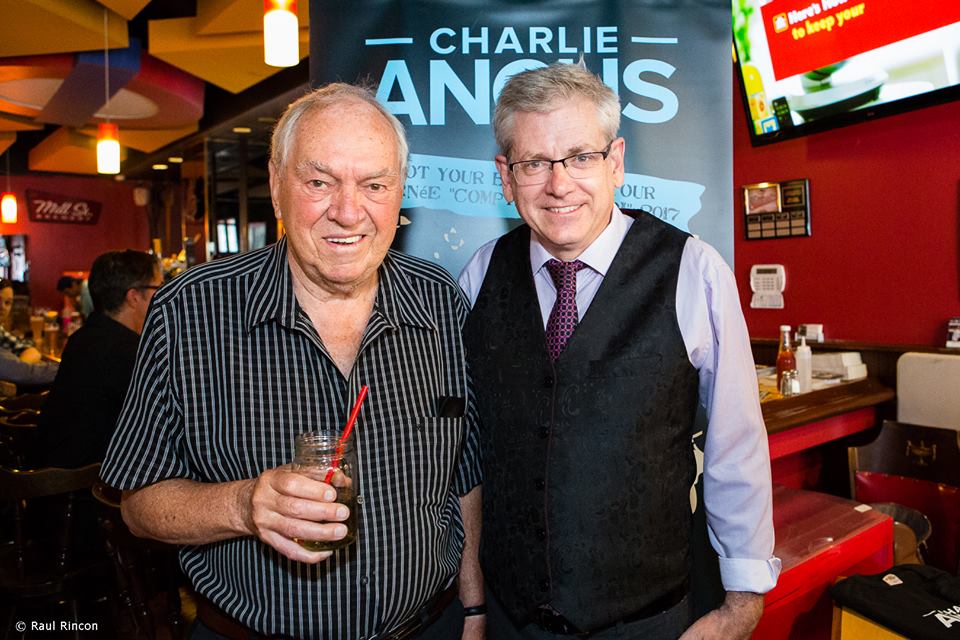Ed Broadbent’s Legacy: A Different Definition of Winning
 With Ed Broadbent at Brixton’s Ottawa during the 2017 leadership campaign/Raul Rincon
With Ed Broadbent at Brixton’s Ottawa during the 2017 leadership campaign/Raul Rincon
By Charlie Angus
January 13, 2024
Tributes are pouring in for Ed Broadbent, who died Thursday at 87. People are praising Ed’s integrity, vision and determination to make politics work for people. I like the line about him being the best prime minister Canada never had. Running through the eulogies is a sense that a better era in Canadian democracy has come to a close. Perhaps our feelings towards Broadbent are tinged with a nostalgic longing for leaders who aspire to more than a headline or scoring a quick gotcha.
Broadbent’s passing comes as Canadian politics is becoming increasingly toxic, dumbed down and personal. The name of the game is swinging for the algorithms, which only serves to augment dysfunction and discord. In the United States, politics has devolved into an all-out culture war; dividing regions, families, friends. While Canada is nowhere near this level of alienation, the disturbing symptoms are here. Little wonder that we long for this sense of an era that is no more in Canadian politics.
But if you knew anything about Ed, you’d know he’d bristle at the idea of this notion that better politics is out of reach. In an interview given just before he died, Broadbent spoke of his optimism that Canadians would embrace a vision of politics that puts the common good at its heart. For Ed, it was always about focusing on the practical steps of making life better and more humane.
And, he was proof that in politics, real winners don’t always take all.
I first met Ed Broadbent when I was an 18-year-old punk-rock kid. Canadian politics was in a dismal state. The economy was in tatters. Union manufacturing jobs were being wiped out across the continent. Ronald Reagan’s militant politics of the “new right” was ascendant. Trudeau senior had lost his mojo. People were cynical. I had no plan to vote.

During my ‘dish pig’ days in Toronto.
I was working as a dishwasher at a downtown Toronto restaurant when Ed Broadbent walked in. Even as someone disengaged from national politics, I knew that Broadbent was a man of integrity. He spoke about justice, labour rights, and building a better Canada. I rushed out of the kitchen to shake his hand and thank him. Broadbent made me believe that politics could be an honourable calling when it focused on being principled and practical.
When I was elected in 2004, I had the honour to sit with Broadbent in the House of Commons during his brief return to parliamentary life to support incoming leader Jack Layton. At our very first caucus meeting, I told him my dishwashing story. Ed loved it. But what I soon learned was that I was just one of thousands of people who had met him over the years and found him to be the real deal. Even though he had been out of political life for years, Broadbent continued to inspire people to believe that a better Canada was possible.
Ed was always a mentor to me, just as he was mentor to so many coming up in my wake. This is one of the reasons he founded the Broadbent Institute. He knew that for left-wing politics to succeed, it needed a framework, analysis, and the support of a broader community of activists.
So, let’s deconstruct the “best prime minister Canada never had.” There was a moment in 1987 when the polling showed that Broadbent could have been PM. But it didn’t happen. His best showing as leader came in the 1988 election where he managed to win 43 seats. He resigned soon after, feeling he had let the party down and was not in a position to take it further. In a world where politics has increasingly become a zero-sum game, Broadbent would be seen as having lost. And yet his legacy stands so much higher than so many so-called winners of that era and the winners in subsequent parliaments.
This is because we can measure Broadbent’s influence in how he used his position as MP, statesman, negotiator to advance key principles that have made a lasting impact on Canadian life. He put the issue of poverty on the national agenda. He insisted on pushing through the recognition of Indigenous Rights in the Charter despite Prime Minister Pierre Trudeau’s deep opposition. Broadbent made this monumental change possible because he was also willing to work with the PM on getting the Charter through a wall of provincial opposition. It was a great victory of principle and practicality working together across the political divide.
The impacts of that victory changed Canada forever and will continue to improve the lives of Indigenous people into the future. Broadbent didn’t win all the marbles in the game of politics but he understood that real success in politics was the willingness to find common ground, and to trust in the decency of opponents and the voting public to do the right thing.
Perhaps in the toxic brew of 2024 politics, Broadbent’s legacy is more important than ever. He showed us that to make a real difference in political life, real winners don’t always have to win it all.
Policy Contributing Writer Charlie Angus is Member of Parliament for Timmins-James Bay. His band Grievous Angels have just released their 9th album, Last Call for Cinderella.
